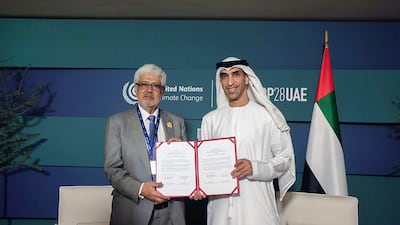The UAE and Colombia have finalised the terms of a comprehensive economic partnership agreement (Cepa) to boost bilateral trade and investment flows.
Dr Thani Al Zeyoudi, UAE Minister of State for Foreign Trade, and German Umana, Minister of Industry, Commerce and Tourism for Colombia, confirmed the conclusion of negotiations by signing a joint statement in the UAE.
This paved the way for the first bilateral trade deal between the Gulf and South American nations, officials said on Saturday.
Once implemented, the Cepa with Colombia will remove or reduce tariffs on the majority of product lines, eliminate unnecessary barriers to trade, improve market access and deepen collaboration across energy, environment, digital trade, financial services, telecommunications, hospitality, tourism, infrastructure, agriculture and food production.
“Colombia is the fourth-largest economy in South America, a major exporter of coffee and a gateway for UAE-based companies to access the enormous benefits offered by the region,” Dr Al Zeyoudi said.
“This deal provides a significant boost to business and friendship between our nations and we are excited about the benefits it will bring.
“With the Cepa in place, our private sectors will benefit from a new bridge to South America and the Middle East – dynamic markets home to more than 800 million consumers.”
The UAE is working towards signing 26 Cepas as it seeks to attract more investment and to diversify its economy.
It has signed Cepas with India, Israel, Turkey, Indonesia, Cambodia and Georgia, each of which are designed to boost economic activity and secure vital supply chains. The first four agreements have already come into effect.
The UAE is seeking to expand trade with partners as it pursues its target of Dh4 trillion ($1.09 trillion) in foreign trade by 2031.
The UAE's non-oil foreign trade hit a record Dh1.24 trillion in the first half of 2023, up 14.4 per cent year on year.
Overall, Cepas are expected to add about 2.6 per cent to the UAE's economy by 2030, Dr Al Zeyoudi said previously.
The Cepa model is central to the UAE’s efforts to double its gross domestic product in the next decade, according to Dr Al Zeyoudi.
“As we continue to build a resilient and highly diversified knowledge-driven economy, forging stronger trade and investment ties with major partners, such as Colombia, is a key pillar of this strategy,” he said.
The Cepa agreement represents a “balanced outcome” that benefits both nations, fostering the exchange of goods and services, while acknowledging the importance of high-level environmental standards, biodiversity and prioritising the protection of natural habitats and conservation areas, according to Mr Umaña.
Diplomatic relations between the UAE and Colombia officially began in 1976 with the inauguration of embassies in 2011 and 2012.
Non-oil trade with Colombia exceeded $380 million in 2022. This climbed 120 per cent in the first half of 2023 to hit $389 million, the statement said.
The UAE accounts for 49 per cent of Colombia's trade with Gulf states, according to Dr Al Zeyoudi''s post on social media platform X, formerly called Twitter.



